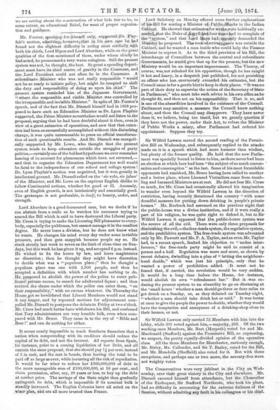Sir Wilfrid Lawson moved the second reading of the Permis-
sive Bill on Wednesday, and, subse.quently replied to the attacks- made on it in a speech which had more humour than wisdom, but plenty of the former quality. .He held that the new Parlia- ment was specially bound to listen to him, as there never had been an election at which beer had been "the subject of so much conver- [ration and consumption" as the last. Some of his most formidable- opponents had vanished, Mr. Bruce haviugheen palled to another and a better place, where Licensed Victuallers cease from troub- liug and harassed Ministers are at rest. He did not fear Mr. Cross so much, for Mr. Cross had occasionally allowed his imagination to wander even beyond Sir Wilfrid Lawson in the direction of restriction, having recently threatened the country "with some dreadful_ measure for putting down drinking in, people's private houses." Mr. Roebuck had assumed on the previous night that- the public-house. was a divine institution, and-if it were really a- part of , his religion, he was quite right to defend it, but to Sir- Wilfrid Lawson it appeared that the. publicrhouse system-was the nource of all the evil. There were only three proposals for diminishing the evil,—thefree-trade system, the regulative system, and the prohibitive system. The free-trade system was advocated only by Mr. Fawcett and Mr. P. A. Taylor, andas even Mr. Taylor had, in a recent speech, limited his objection to " undue, inter- ference," the free-trade party might be said , to consist of . a person and a half. Regulation was more and more, as shown by- recent debates, dwindling into a plan of " letting the neighbour- hood decide," which was just his principle, only that he a power of prohibition added. It must not be- feared that, if carried, the revolution would be very sudden. It would be a long time before the House, for instance, would abolish its own "refreshment bar." But it was re- ducing the present system to an absurdity to go on discussing at the small hours' whether a man should go three or four miles to- get drunk on a Sunday, or, as they debated on Tuesday night, " whether a man should take drink hot or cold." It was better at once to give the people the power to decide, whether they would have the temptation and annoyance of a drinking-shop close to. their houses, or not.


































 Previous page
Previous page